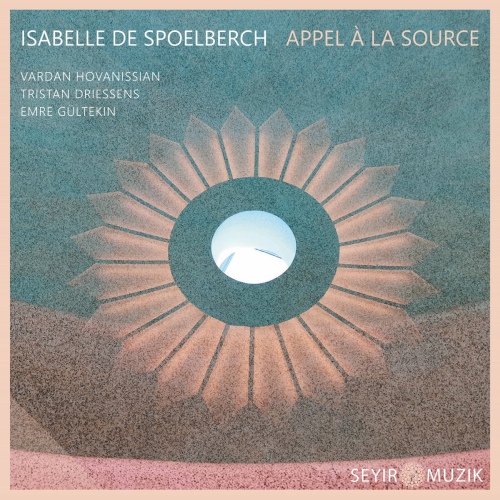
Isabelle de Spoelberch : harpe celtique, kantele, santur, tambour sur cadre, bol tibétain, Vardan Hovanissian : duduk arménien, Tristan Driessens : oud, chant, Emre Gültekin : baglama, diwan saz, yayli saz, üç telli, rabab afghan, bendir, chant.
Guests: Bijan Chemirani : daf, tombak (2), Franz Reschenhofer : récitation (3), Malabika Brahma : chant, bol tibétain (14, 18), Moussa Niang : chant (13), Raphaël De Cock : uilleann pipes (4), chant diphonique (10), Sanjay Khyapa : dupki (7), Jowan Merckx : flûte à bec (4), Jeroen Geerinck : guitare, bodhran (4), Vincent Noiret : contrebasse (4).
Isabelle de Spoelberch was born into a family where music plays an important role in everyday life. During her childhood she fell in love with the harp and started cultivating a deep fascination with Celtic traditions and medieval music. She took harp lessons with Arianna Savall and Robin Huw Bowen and studied instrument making at the Fachschule für Streich und Zupfinstrumentbau in Hallstatt, Austria.
On her debut double album, the Celtic harp is the common thread through a journey of discovery along different roads and cultures. New compositions and traditional music are alternated with long improvisations in which the harpist enters into a dialogue with the Armenian duduk, the Turkish saz or the Persian tombak. The music of ?Appel à la Source? pays tribute to what music from different corners of the world ?à la source? have in common. Isabelle de Spoelberch is inspired by Scandinavian mythology, shamanism, the four elements of nature, Eastern mysticism and the ancestral tradition of wandering singer-poets in Anatolia, Bengal and Senegal. All these influences are interwoven in a richly varied and mysterious album on which twelve guest musicians from seven different countries have contributed.
